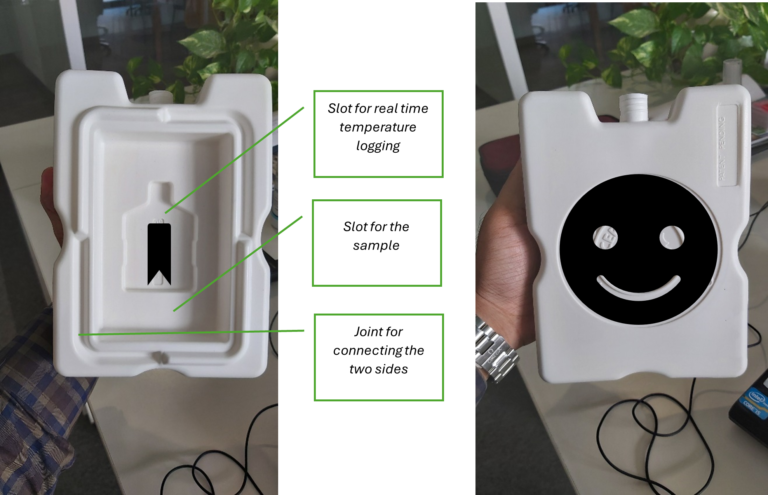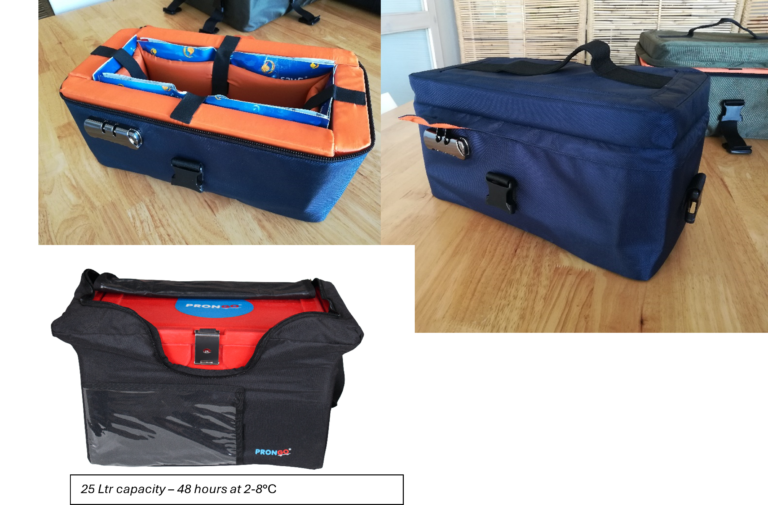At-Home blood sample Collection: Importance of Temperature integrity
In May 2022, Arshita Mahesh Aggarwal, the daughter of a high-ranking IPS officer, experienced a distressing situation during a home blood test in Chennai. After paying Rs.950 for the service, the phlebotomist’s* negligence left her with a painful bruise and a questionable report. The lab indicated her T4 (thyroxine) level was 5.6 nmol/L, starkly outside the reference range of 52 to 127 nmol/L. This alarming result led to considerable stress and a whirlwind of medical consultations, only for a retest at another lab to reveal normal levels. Seeking justice, Arshita approached the Chennai District Consumer Disputes Redressal Commission for compensation.
*Phlebotomy – the drawing of blood – has been practised for centuries and is still one of the most common invasive procedures in health care. Each step in the process of phlebotomy affects the quality of the specimen and is thus important for preventing laboratory error, patient injury and even death. For example, the touch of a finger to verify the location of a vein before insertion of the needle increases the chance that a specimen will be contaminated.
The Root of the Problem: Pre-Analytic Errors
The lab dismissed the error as typographical, but the real issue might lie in the pre-analytic phase of sample collection. This phase, encompassing the time from sample collection to lab processing, is critical and particularly challenging in home sample collection. Temperature control plays a pivotal role, as samples must be maintained between 2-8°C to remain viable.
 Designed by Freepik
Designed by Freepik
In India’s scorching climate, this requirement is difficult to meet, especially when samples are transported over long distances.
Why Temperature Control Matters
Blood samples exposed to extreme temperatures can undergo biochemical changes that compromise their integrity.

Blood is a complex mixture of cells, proteins, enzymes, and molecules. Temperature fluctuations can cause proteins to denature, enzymes to deactivate, and cells to degrade. These changes lead to inaccurate test results and potential misdiagnoses, jeopardizing patient care.
According to the University of California, Los Angeles, blood components should be stored as follows:
Red blood cells can be stored for up to 42 days at 1°C to 6°C, depending on additive.
Platelets can be stored at 20°C to 24°C for up to 5 days with constant agitation.
Plasma that is frozen at temperatures of -18°C or below within 8 hours of collection, platelets can be stored for up to 1 year.

Designed by Freepik
Innovation in thermal packaging solutions:
To combat these challenges, thermal energy storage materials like Phase Change materials (PCM) are yet not fully exploited to its potential. The combination of PCM, insulation and its selection offers the thermal packaging industry to innovate and engineer thermal packaging solutions that solve several problems around precise and safe transport of diagnostic samples.
These materials offer an array of temperature options to create a robust, foolproof and custom solution depending on the required temperature, duration and criticality. PCMs are at the forefront of this innovation. PCMs absorb or release energy as they change phase, providing precise temperature control. Unlike traditional ice, PCMs offer long-lasting thermal stability.

Courtesy: RGEES LLC/Paradigm – Innovative sample carrier which doubles up as the PCM coolant carrier offering a robust protection
When designed with a phase transition temperature matching the ideal storage range, PCMs ensure samples remain within the 2-8°C window, even in extreme conditions.
Need for a different approach and temperature for different samples
Pre-validated temperature-controlled packaging using PCMs can maintain the critical 2-8°C range. This technology not only prevents temperatures from rising above 8°C but also keeps them from dropping below 2°C, even during India’s hot summers.
For certain samples such as for blood platelets which require controlled room temperature which is defined as +15 to +25°C. Selection of specific PCM designed to maintain this range is used instead of using gel packs or ice packs which are not recommended.
Whole blood intended for platelet separation must be maintained at +20 to +24°C prior to processing, as lower temperatures can impair platelet function and their separation efficiency. Platelets should be prepared within 8 hours of blood collection and stored at 20-24°C with continuous agitation to prevent aggregation, which could compromise their viability. Depending on the type of blood bag used, platelets have a shelf life of 3-5 days. Due to the room temperature storage, there is a risk of bacterial contamination; hence, the storage area should consistently remain below 24°C. During transport, platelets should be kept in a blood transport box that maintains a temperature range of 20-24°C. Platelets must not be refrigerated and should be transfused as soon as possible.

What it enables: Precise and robust Temperature control
Implementing PCM-based temperature-controlled packaging in sample transportation could transform healthcare diagnostics. Reliable temperature control ensures accurate test results, reducing stress for patients and their families.
PCM based range of products like the Prongo® bag and Celsure® from Pluss demonstrates the efficacy of PCM-based solutions in real-world condition;


More examples of different form factors and design to enable operational ease and functional enhancements shown in the images below;

Conclusion
Arshita’s story highlights the critical importance of proper sample transportation in healthcare diagnostics. Embracing innovative solutions like thermal energy storage with PCMs can mitigate temperature-related risks and ensure the reliability of test results. It’s time to execute on and embrace technologies in materials, thermal engineering and digital integration which are today available towards development of future of blood sample collection & transportation in healthcare.
Author: Deepika Singhal & Vishnu Sasidharan
Contributor: Raman Chauhan








